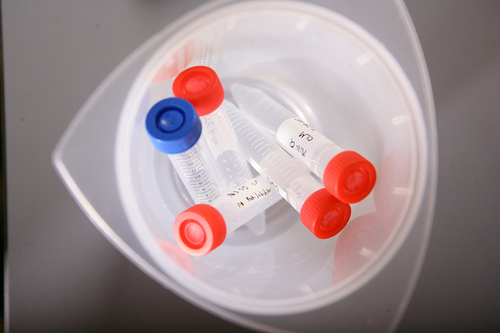
Two postdoctoral scholars from the University of Notre Dame have received Postdoctoral Training Awards in Translational Research from the Indiana Clinical and Translational Sciences Institute (CTSI). The fellowship is designed to provide an “opportunity to be mentored in research-intensive multidisciplinary settings toward the goal of developing careers in translational research.”
 Guido Camargo España
Guido Camargo España
Recipients of the Indiana CTSI fellowship are Guido Camargo España, postdoctoral research associate of biological sciences, and Jesus Alonso, postdoctoral research associate of chemistry and biochemistry. Camargo España received his fellowship for work with Alex Perkins, Eck Family Assistant Professor of Biological Sciences at Notre Dame and affiliated member of the Eck Institute for Global Health, and Timothy Endy, professor at State University of New York. For the project, he will conduct simulation modeling to estimate dengue vaccine profiles from trial results.
Currently, there is a dengue vaccine that has shown efficacy in treating patients who have already been infected with the dengue virus. However, the same vaccine, when given to those who have never contracted the dengue virus, can have harsher effects if those people eventually contract the virus.
“There are certain unobservable variables affecting dengue vaccine trials,” said Camargo España. “Therefore, our goal with this research is to simulate these trials using agent-based computational models to better understand what those variables are and how they impact our estimates of the effect of the vaccine.”
 Jesus Alonso
Jesus Alonso
Alonso, postdoctoral research associate of chemistry and biochemistry, received his fellowship to work with Brian Baker, Rev. John A. Zahm Professor of Chemistry and Biochemistry at Notre Dame and affiliated member of the Harper Cancer Research Institute, and Michael Nishimura, surgical research professor at Loyola University Medical Center and program director of immunologic therapeutics. Alonso’s research will involve developing a structure-guided design and characterization of a T-cell receptor that is used in cancer immunotherapy for treating metastatic melanoma, or skin cancer that has spread to other areas of the body.
“Cancer cells express certain proteins in excess,” said Alonso. “Our objective is to use a T-cell receptor, which is essential to the body’s immune response, and engineer mutations on the receptor to better target cancer-specific proteins particularly associated with skin cancer.”
The Postdoctoral Fellowship in Translational Research offers funding for one year and the potential to renew the fellowship for one additional year. To learn more about this award and other Indiana CTSI funding opportunities, visit https://ctsi.nd.edu/funding/.
The Indiana CTSI is a statewide collaboration of Indiana University, Purdue University and the University of Notre Dame, as well as public and private partnerships. Established in 2008, the Indiana CTSI is supported by a $25 million Clinical and Translational Science Award from the National Center for Advancing Translational Sciences of the National Institutions of Health, supplemented by nearly $60 million from the state, the three member universities, and public and private partnerships. The Indiana CTSI is a member of a national network of CTSA-funded organizations across the United States.
Contact: Brandi Klingerman, research communications specialist, Notre Dame Research, 574-631-8183, bklinger@nd.edu; @UNDResearch
Originally published by at ctsi.nd.edu on Oct. 19.